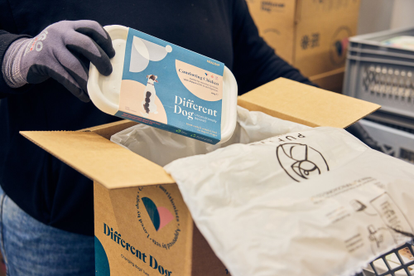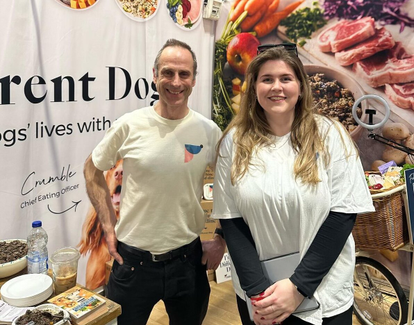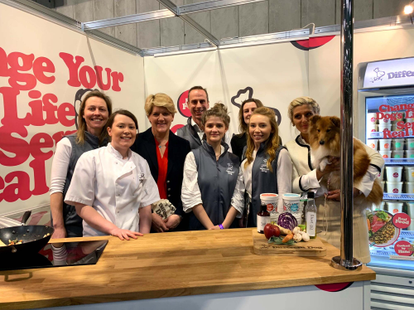Free treat & 30% off your first box!Free treat & 30% off your first box! Use code REAL30
Tips on how to feed your puppy

This week our Vet and Nutritionist answer your questions about feeding your puppy.
How do I change my new puppy’s diet to something I’d prefer them to have?
Make sure you have a small amount of the food your puppy has been fed by the breeder, even if it’s not your choice. Leaving their mother and siblings and the environment they’ve known, is stressful for any puppy – so it’s best not to make any dietary changes at all in the first few days. Then, after a few days, introduce the new diet very gradually over the course of the next week.
How many meals does a puppy need daily?
Puppies tend to go to their new home at between 7 and nine weeks old:
-at this age they will often still be on four meals per day,
-dropping to three meals at approximately twelve weeks old
-and down to two from approximately six months old.
What’s included in a puppy diet for optimal health and growth?
Ideally a puppy diet should:
- Be highly digestible as puppies have a high requirement for energy and nutrients but less digestive capacity.
- Provide the correct amount of energy to enable growth but not have an excess of calories that would promote unwanted rapid growth or obesity.
- Provide adequate high quality protein to support growth, including all the essential amino acids.
- Contain plenty of Essential Fatty Acids (EFA’s) -these are required early in life for normal neurological and retinal development . These include omega 3 (e.g. oily fish such as salmon, flaxseed oil etc) and omega 6 fats – getting the right omega3:omega6 ratio is important.
- Be rich in Antioxidants – there is evidence that dietary antioxidants, such as berries and leafy green veg support healthy immune responses and puppies fed antioxidant rich food, had higher antibody levels after vaccination.
- Be Complete and balanced to provide adequate amounts of all the essential vitamins and minerals a puppy needs to grow and thrive, without any deficiencies or toxicities and with ratios of certain minerals adhered to.
- They obviously need access to clean water but do not require milk.
Should I give my puppy supplements to support their growth?
Supplements should not be required if you’re feeding a complete and balanced diet that’s formulated for puppies or is appropriate for all life stages. Contrary to popular belief, calcium and phosphorous supplements are not necessary for growing pups and can be harmful – especially in large and giant breeds where they can contribute to skeletal disorders.
How much do I need to feed my puppy?
As mentioned above, it’s important not to overfeed the growing pup. Always feed to body condition – maintaining a lean and well muscled body condition throughout the growth period will support a moderate rate of development and prevent your puppy getting overweight.
Based on the data you provide us with we will estimate how many calories your puppy needs. This amount will increase gradually whilst they’re in their rapid growth period, until they’re 4 to five months. Large breeds grow relatively more slowly and have a longer growth period, so reach adult size at an older age in months than small breeds.

Our top tips to keep your puppy healthy:
The Importance of introducing diversity within your puppies diet
This is vital to assist in longevity later in life, however needs to be done carefully. A variety of complete diets e.g. fresh, raw, wet, kibble can be introduced during weaning of puppy (whilst still with mum) when there are minimal outside influences. At this stage puppy health from a microbiome perspective is adaptable and supported via the mothers antibodies and support from her milk. If this has not been done at weaning, it is still important to introduce variety but, as discussed above, be aware that moving to a new home, new surroundings, new instructions, loss of litter mates, vaccinations etc. can be stressful and this is not the time to add more change through their diet! Let the puppy settle and establish themselves before steadily trying a variety of foods. These could be fresh fruit and vegetables (dog appropriate) or new proteins.
The Importance of Appropriate Exercise
Exercise is important for puppies’ mental and physical wellbeing but one must avoid over exercising. Too much exercise at a young age has been associated with joint problems. A rule of thumb is to allow them 5 mins per month of age up to twice daily (so a 5 month old puppy= up to 25 minutes). Never take a puppy for forced exercise, like running on a lead alongside a cyclist.
The Importance of Socialisation
Early socialisation is important for a puppy to develop into a confident dog. Socialisation is the process by which puppies learn to behave appropriately towards humans and other animals by having numerous positive encounters with adults, children, dogs and other animals. It also involves becoming used to a wide range of environments and situations.
From approximately 12 weeks old, a puppy will tend to approach new situations with caution – so it is important to start the socialisation process as soon as they come to their new home at 8 weeks and keep this going through their puppyhood.
If you have any questions at all, please do get in touch at feedme@differentdog.com




Join The Pack
Receive exclusive offers, tips and tricks from our vet.
